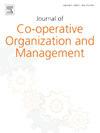An exploration of the relationship between member openness and perceived organisational openness at a particular point in the co-operative lifecycle
Abstract
Co-operatives are essentially relational entities which are jointly co-created by members and the co-operative. This relational co-creation is particularly important in the founding years of the co-operative and at points of crisis and regeneration in the co-operative lifecycle. This paper explores the relationship between member openness towards relational engagement and their perception of the co-operative’s openness to that input (perceived openness) in a credit union context, prior to a major period of restructuring. Perceived openness is examined from two distinct perspectives, that is, awareness of right of involvement as owners (which in this paper we equated with co-operative member ownership structure) and possibility of involvement or perception of organisation openness (which in this paper we equated with co-operative process). It was found in the multivariate Logistic model that possibility rather than right of involvement is related to member openness. This suggests that the process of co-operation in a co-operative plays a greater role than the organisational structure of that co-operative in facilitating member input. This is a significant finding and suggests that greater attention needs to be given to process and openness in co-operative research and practice. It also suggests that co-operatives cannot just draw on their member ownership structure, in building member engagement at time of crisis.

 求助内容:
求助内容: 应助结果提醒方式:
应助结果提醒方式:


